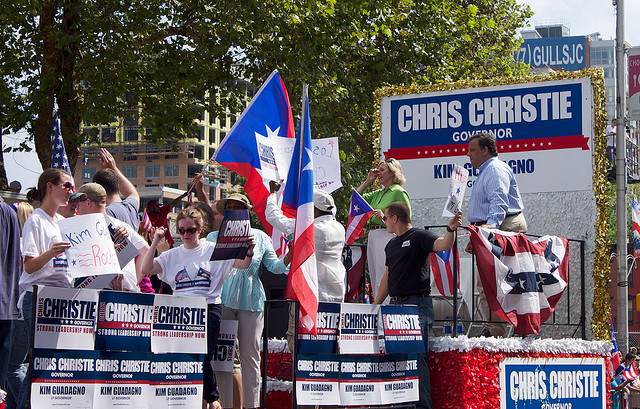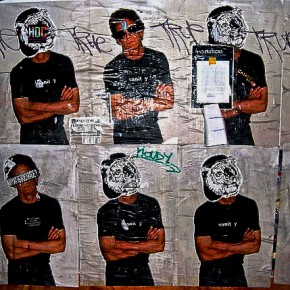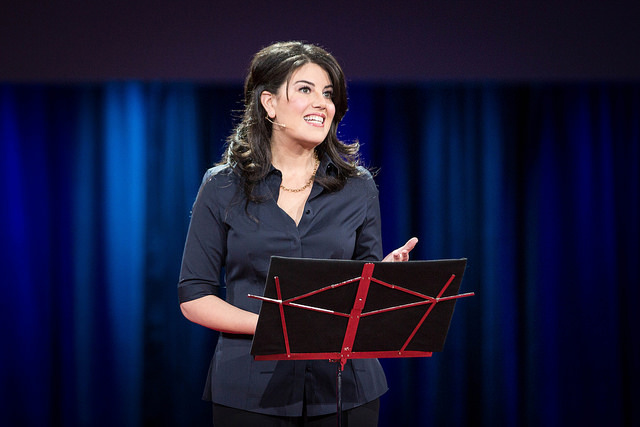Chris Christie is bracing himself for what is likely a landslide re-election Tuesday. Almost on cue, another video has been circulating that portrays the governor at his most infamous: rude, and confrontational, against a schoolteacher who was critical of his education reform strategy. As analysts turn their attention to New Jersey, it’s important to evaluate how Christie got to this point, and why he’s so popular.
I was a freshman at Rutgers University when Christie ran against Democrat incumbent Jon Corzine in an energized gubernatorial bid. I remember attending an event in the Rutgers gymnasium in which Bill Clinton urged us to vote for Corzine, citing a list of his achievements. I was not aware of the fact that this election, and the reason that Clinton was even talking to us, was of particular concern to the Obama Administration.
President Obama would also stop in the state, and Vice President Joe Biden characterized Corzine as “America’s governor.” Even then, the Democrat Party was wary of the immense popularity that the Republican Christie had in a reliably blue state.
Much of this had to do with an exhausted New Jersey electorate in 2009. Governor Corzine himself was deeply unpopular, even in his own party, and was implicated in a number of corruption and environmental scandals. Add to this the fact that Corzine’s campaign focused on education, which appeared less important than Christie’s attacks on the economy and state taxation, and the Democrat was even more marginalized.
The breakthrough of Independent Chris Daggett in the election, with 5.8% of the popular vote, is clear enough evidence of disillusionment from New Jersey’s liberal voters. Third party success in American elections is usually based on how much voters believe that their ballots actually matter. Daggett’s tally was a result of how New Jersey voters believed that theirs did not. The result of this philosophy, especially as it resulted in progressives staying home, was a Republican governor in a blue state.
Many New Jersey liberals found this surprising. I recall similar reactions in my native Canada, when Stephen Harper rallied the Conservative Party to victory in 2006. It’s based on an overestimation of how liberal a particular electorate actually is, and a simultaneous underestimation of conservative appeal as an alternative. It is particularly irritating in New Jersey, in which citizen rage continues to be better articulated by ideological conservatives.
Part of Christie’s political genius is that he has been able to garner so much local support for his privatization campaigns, whether in his assault on public sector pensions, or his pressing for deeply-flawed educational standards. Although the latter is troublingly bipartisan in the United States, it’s still jarring that such conservative policies could be successfully implemented in New Jersey.
However, on closer examination, it isn’t all too surprising. Christie just managed to brand his initiatives correctly. He did so by carefully considering the massive complexities of New Jersey politics.

Owing primarily to how many townships separated from large urban centers in order to minimize the scope of integration, New Jersey politics are intensely local. The link is complicated, and owes to many factors, but is broadly a consequence of white flight.
New Jersey has 565 municipalities. Although its state income tax is the lowest of the 43 states that have that tax, it has the highest local property taxes in the nation. One of the main reasons this is the case is because municipal expenditure is so high: those independent townships happen to need their own school boards, police departments, and so on.
The wealth inequalities of those 565 municipalities are so intense that ultra-rich towns like Upper Saddle River can exist in the same company as troubled urban areas like Camden, one of America’s most dangerous and impoverished cities.
These divisions breed an illusion of classlessness – one that only New Jersey can produce. This means that rage is very provincial in New Jersey, especially amongst the middle class. Christie knows that.
The governor’s projects have occurred through a fascinating manipulation of this municipal character, by targeting local characters as enemies of specifically middle class districts. Property taxes disproportionately affect New Jersey’s lower middle-class, especially during a wider recession that has left homeowners in an especially precarious position. This is a situation that has been exacerbated by moves such as his repeated vetoes of a proposed millionaires tax, which effectively shifts the state’s tax burden further downward.
Christie has used this to garner support by channelling resentment towards public sector employees. For instance, education is done with teachers, such as the most recent one he yelled at, and state pensions with police officers and firefighters. Christie is aware that this presents his supporters with enemies in their own municipality, rather than New Jersey, more broadly. Their anger becomes centered on specific people that they recognize locally, which is a strategy that works particularly well, locally. He then rides their rage to victory.
Christie also knows how to play the opposition. Although there are Democrats such as Representatives Frank Pallone and Rush Holt, who passionately oppose his initiatives, many support them as fiscal conservatives themselves, most notably Corey Booker.
New Jersey also happens to have an endemic problem of a complex system of “bosses,” such as in unions, or in its political elite. This leadership includes such important figures as State Senator Stephen Sweeney, and powerful South Jersey fundraiser George Norcross III. They’re experts at manipulating politics on municipal levels. Without their allegiance, serious state politics are almost impossible. It’s a good test of a liberal’s local political literacy to see how exhausted that person is with the New Jersey Democrat Party.
Many organizers speculate that one of the myriad reasons that Christie’s challenger tomorrow, State Senator Barbara Buono, is polling so poorly (Christie has had a double-digit lead since the beginning) is because of her mixed reception among these bosses. Many have sided with Christie, or have simply abandoned Buono, with Sweeney as a notable exception. “Blue state” doesn’t happen to mean much in these discussions.

But what about Christie’s personality? His bullying is nothing new. In fact, we’ve come to expect it. Nevertheless, it’s worth wondering why New Jersey has become so enamored by such an aggressive governor.
Part of this has to do with the state’s culture. An ongoing joke in New Jersey is to debate whether North or South Jersey is better (and whether “Central Jersey” even exists.) As an immigrant, I have always been fascinated by these discussions, mainly because of how heavily they seemed to be comparisons between New York City and Philadelphia.
Despite minor differences, such as convenience store chains, there has always seemed to be a great deal of anxiety in New Jersey about how much of the state navigates its identity in respect to larger urban centers. This is particularly interesting in the state’s southernmost areas, which culturally identify more with the Deep South.
Christie furthers a particular form of New Jersey identity that breaks through this anxiety. He advances an aggressively carnal reading of the shoreline, with its ties to the boardwalk and Bruce Springsteen. His strength of personality is that of the Jersey Shore’s popularly-imagined working class: passionate, community-oriented, and argumentative.
Another part is that New Jersey has simply gone for figures like Christie in the past. I spoke to Matt Cordeiro, my former student body president and now an associate at political start-up TurboVote, who grew up in the state. “Jersey has a history of liking somewhat brash politicians,” he told me. “Former governor Dick Codey‘s approval rating received a huge bump when he threatened a reporter who had insulted his wife.”
“However, for all of Christie’s aggressiveness, it was his sincerity that won over many New Jersey-ans. After Hurricane Sandy, Christie understood what the destruction meant for folks. How many memories had been literally swept away to sea, because he was also genuinely mourning the loss.”
That much is true. The other side of Christie’s uninhibited rudeness is something that Americans have been conditioned not to expect from their politicians in an era where their every statement is polished: raw humanity.
Cordeiro is also right about Hurricane Sandy propelling Christie into a positive spotlight, both in New Jersey where his approval skyrocketed (and has stayed there,) and also nationally. It was hard not to be moved by images of him navigating the wreckage, particularly at Seaside Heights, and somewhat galvanized by his rebuking of the Republican leadership, at first for being offended at him praising President Obama’s leadership on the matter so close to the election, and then by delaying the authorization of a Sandy relief bill.

Of course, even as it was happening, I could sense the opportunism. Christie is a skilled politician, and had to know that his bipartisan statements about “acting like adults” would be very appealing on a national stage. While mourning the damage, he also happened to advertise himself as an ideal alternative to the Tea Party: a Republican that can actually work, and play nice, in Washington, D.C.
His coming presidential campaign rests primarily on whether or not the Republican Party, exhausted with its own leaders, accepts this branding and supports him as a candidate who can get the lunatic fringe under control. Many Republicans yearn for a Goldwater-style rebuke of the Tea Party that can restore sensibility to their party. Christie could successfully advertise himself as the one to do it.
However, the governor has many challenges to overcome. One of them is his weight, which has unfairly been a source of much ridicule (and uncomfortably so in progressive circles,) but could be seen as a concern for the presidency. Potential health complications have been important in the past, such as with the ages of previous contenders Bob Dole, and John McCain.
Other issues were already noticed when Mitt Romney scouted Christie as a potential running mate. This includes his need for Sopranos-style dominance, as Romney allegedly made just that comparison when Christie required his personal OK for the candidate’s fundraising in New Jersey.
However, Romney’s researchers were shocked at other potential controversies. These include a defamation lawsuit brought against him after a successful 1994 election run, his erratic spending patterns as a U.S. attorney prior to his governorship, and his decision to favor donors and allies, such as former Attorney General John Ashcroft, for government contracts. The latter led to a congressional hearing. Most important is the period he worked as a lobbyist for the Securities Industry Association, and sought exemption from the state’s Consumer Fraud Act. This was during a period when Bernie Madoff sat on its Board of Directors.
These and other problems, such as the status of Christie’s investments, may come to frustrate his presidential ambitions. Regardless, Americans are about to hear much more about Chris Christie. And we may discover nationally why he worked so well in Jersey. Personally, I am already expecting some sort of “Jersey takes the White House” campaign slogan, specifically designed for the Garden State.
Photographs courtesy of Akshat Aranya, tommy japan, Kim Carpenter, and Paul Lowry. Published under a Creative Commons License.





